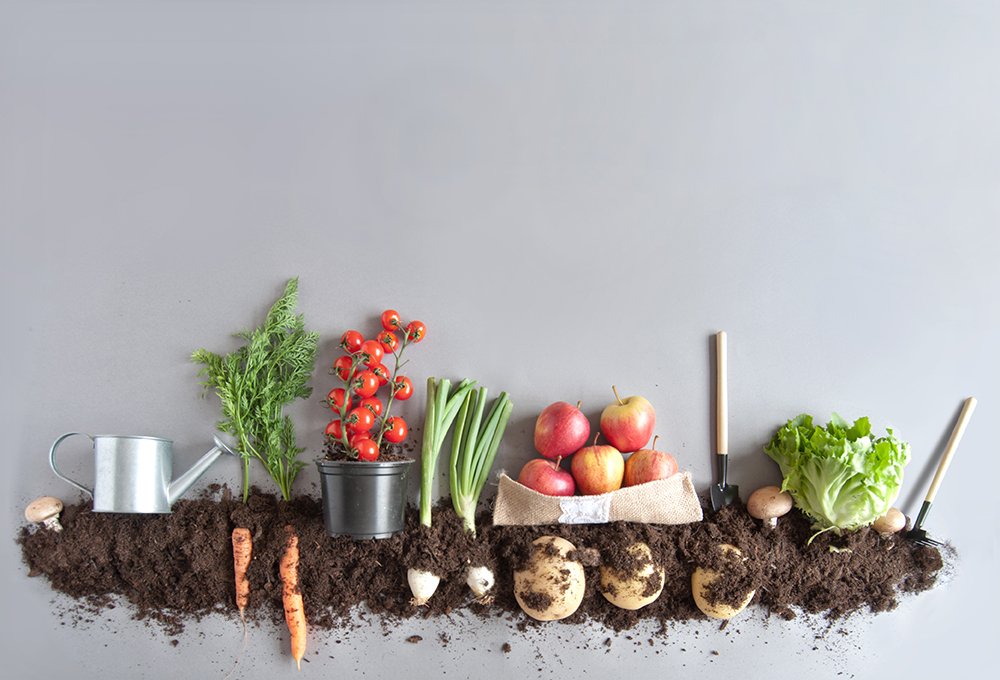
Organic foods have become increasingly popular over the past 10 years, so it’s natural to wonder what’s behind the hype? You might also wonder why some foods labelled as organic or sold in organic farmer’s markets are pricier.
One of the main reasons that organic food has hit the mainstream is because it’s claimed to be free from pesticides. This minimises the harmful effects of toxic chemicals which have been linked to a range of health and environmental impacts. But there are so many more reasons why organic food is now the preferred option for many.
This article will guide you through the world of organic foods, their importance, benefits, and basic facts. Keep reading for everything you need to know.
#1 – What Does Organic Actually Mean?
The word “organic” refers to how agricultural products are grown and processed. While standards differ by country, organic crops in the USA must be farmed without the use of synthetic pesticides, herbicides, or fertilisers, and without bioengineered genes (GMOs).
Furthermore, organic meat, eggs, and dairy products must come from livestock that has been raised under natural living circumstances. The animals must be able to enjoy their natural behaviours like grazing on natural pastures. They are fed organic forage and feed. To know more about healthy food, click here.
Organic production also means that the animals do not receive regular antibiotics. Cattle and poultry are kept away from any growth hormone injection or any animal by-products. This ensures a more healthy and sustainable way of raising livestock that causes less of a harmful impact on the environment as well as the end consumers.

#2 – Organic Production – The Basics
In the USA for example, to get the official organic seal of approval, the final product must adhere to strict production, handling, and labelling criteria, according to the United States Department of Agriculture (USDA).
These are the rules which are compulsory for ‘organic’ production: livestock should have access to the outdoors, they need healthy living conditions and enjoy at least 30% pasture feeding. They must also be free of antibiotics or growth hormones and eat organic foods themselves.
Some methods that are not allowed in organic farming include: using sewage sludge as fertilizer, use of synthetic fertilisers, almost no usage of synthetic pesticides, no genetic engineering and no irradiation.
#3 – Organic Vs. Non-Organic
To help you understand the differences between organic and non-organic food easily, take a look at this table.
|
Organic Produce |
Conventionally Grown Non-Organic Produce |
|
Grown with natural fertilisers like compost and manure. |
Grown with synthetic or chemical fertilisers. |
|
Weeds are controlled naturally with organic-approved herbicides or by hand weeding, crop rotation, tilling, and mulching |
Chemical herbicides are used to control the weed. |
|
Naturally derived pesticides or natural methods like exposing the crops to insects and birds are used to control unwanted pests. |
Synthetic pesticides are used to control pests. |
|
Organic Eggs, Meat, and Dairy |
Conventionally-raised Non-organic Eggs, Meat, and Dairy |
|
Organic, GMO-free, and hormone-free feed is given to all livestock. |
For faster growth and maximized mass, livestock is injected with growth hormones and fed non-organic, GMO feed. |
|
Natural methods, such as a healthy diet, rotational grazing, and clean housing, are implemented to prevent diseases. |
Diseases of livestock are prevented by antibiotics and medications |
|
The livestock must have outdoor access. |
Livestock does not usually have access to the outdoors |
#4 – Benefits of Organic Food
There are many benefits of consuming organic foods. Some of these advantages are listed below.
Organic Foods Are Better for Your Health
Your physical and mental health, as well as the environment, are all affected by how your food is grown or farmed. Some people with allergies to certain foods, chemicals, or preservatives discover that their symptoms are alleviated when they have a diet that consists of organic foods only. This is mainly because organically produced food has more nutritional value and has no synthetic additives.
Organic Foods Use Lesser Pesticides
Pesticides are less prevalent in organic vegetables. In conventional agriculture, chemicals such as synthetic herbicides, insecticides, and fungicides are frequently used, and residues linger on (and in) the food we consume.
Organic Foods Are Fresher
Since organic food does not contain preservatives that extend its shelf life, they are often fresher. Organic produce is sometimes (but not always) grown on smaller farms closer to where it is sold (so keep an eye on where it comes from).
Organic Farming and Consumption is Better for the Environment
Organic farming tends to be more environmentally friendly. Organic agricultural practices minimise pollution, reduce soil erosion, preserve water, boost soil fertility, and use less finite resources. Farming without synthetic pesticides is also beneficial for people who live near farms, as well as birds and animals in the area.
Organic Livestock Are Raised Naturally
Antibiotics, growth hormones, and animal by-products are not used in organically raised animals. The use of antibiotics can develop antibiotic-resistant bacteria strains, and feeding cattle animal by-products raises the risk of mad cow disease. Animals grown organically have more space to move about as they have access to the outdoors, which helps them stay healthy.
Organic Foods Are More Enriched and Nutritious
Certain nutrients are more prevalent in organic meat and milk. Many studies show that organic meat and milk had up to 50% greater amounts of some nutrients, such as omega-3 fatty acids than conventionally farmed meat and milk.
Organic Foods Contain Lesser Toxins
Cadmium is a poisonous metal that can harm the human body. Because organic farming does not use synthetic fertilisers, organic grains contain less cadmium. Organic vegetables contain fewer pesticide residues than conventional produce. Certain pesticides have been shown to have negative impacts on children’s cognitive development at certain levels of exposure, according to research. However, individual pesticides and their effects on people have yet to be thoroughly investigated.
Organic Foods Are All Natural and GMO-Free
GMOs are not present in organic food. GMOs, also known as genetically engineered (GE) foods, are plants whose DNA has been changed in ways that are not possible or through traditional crossbreeding, most typically to make them pesticide-resistant.
#5 – Difference Between Organic Food and Locally Grown Food
There is no formal definition for “local food,” unlike organic standards. It can be cultivated in your neighbourhood, state, area, or country. During the majority of the year, food grown near to home can generally be found at locations like a farmer’s market.
Some small farmers in the locality employ organic practices, although they may not be able to pay to be certified organic. You can visit a farmer’s market and inquire about how they grow and prepare their products.

#6 – Benefits of Locally Grown Food
There are numerous benefits of opting for locally grown food. Some of them are here below.
Supports the Local Farmers and the Economy
The money stays within the community. Instead of going to marketing and distribution, the money goes directly to the farmer. It is an efficient and sustainable practice.
The Local Produce Are Not Adulterated With Synthetic Chemicals
In the United States, a meal travels nearly 1,500 miles from the farm to the dinner plate. Produce must be collected when still unripe and then gassed after shipment to “ripen” it. In other cases, the food is heavily treated in factories, where preservatives, irradiation, and other methods are used to keep it stable for transport.
Local produce doesn’t require any transportation, and so farmers do not need to pick the crops prematurely. They are not drenched in synthetic chemicals and therefore, they’re safer to consume.
Locally Grown Food Is Often Fresh
As mentioned earlier, local food is not usually treated with any adulterating additives. Local produce is harvested when it is ripe, making it fresher and more flavourful. Meals made with the local produce taste better and are healthier. This makes healthy mealtimes more enjoyable.
#6 – Are Organic Foods Free of Pesticides?
Low pesticide levels are one of the key advantages of eating organic. Contrary to common assumptions, pesticides are used in organic farms. The difference is that they only use natural pesticides rather than synthetic pesticides that are commonly utilised on commercial farms.
Natural insecticides are thought to be less hazardous, yet some have been linked to health problems. However, eating organic will likely reduce your exposure to dangerous and toxic pesticides, irrespective.
#7 – Why Is Organic Food Expensive?
Organic food requires more labour since it is produced without the use of synthetic chemical fertilisers, pesticides, or medications. Organic certification is costly, and organic animal feed can be twice as expensive. Without government subsidies, fixed expenses and overhead must be spread across lower production volumes because organic farms are often smaller than conventional farms.
In Summary
Organic foods are proven to have a lesser harmful impact on the environment. Organic farming is a sustainable practice and supports the local economy, encouraging proper livelihoods of the humble farmers. Foods that are naturally cultivated contain lesser toxins and are more nutritious.
Organic foods also have a better flavour, making them more enjoyable to eat! Opting for organic produce and meat are better food choices. It can be a bit pricey to eat solely organic foods, but it’s worth it.

No Comments